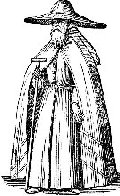Articles
Ministries
Videos
Books
Wicca, William Schnoebelen The Occult, Josh McDowell and Don Stewart Powers: Testing the Psychic and Supernatural, Dan Korem
Suggestions
Show Wiccans and Pagans genuine Christian love, and pray for them. Respect their beliefs (although this does not mean you have to agree with them). Try and understand their beliefs. Don't just read Christian articles and books about Paganism - do the research yourself. Get some books out by respected pagan authorities, take notes from them, and share interesting portions of what you discover with them. Ask them what they believe about Christianity (many pagans have a distorted image of what Christianity is). Where they are wrong, correct them. Understand that many Pagans and Wiccans have had bad experiences with churches in one way or another. Some have even been brought up in an environment which professes Christianity. Stress the relationship that Christians have with Christ. Stress the heart of the Gospel: The death, resurrection, ascension, and second coming of Christ. Outline the strengths and reliability of the Bible, as many pagans reject it as unreliable. Understand that most Pagans and Wiccans reject the concept of objective truth. Stress the truth which is to be found in Christ.
—from Spotlight Ministries
Stories
|
The following article has been written from a variety of different sources. These include: My own former experience with Witchcraft and occultism in general prior to my conversion to Christ, reading various Pagan and Wiccan literature, having Pagan and Wiccan friends, and having numerous email, message board, and chat room dialogues with those in the Pagan communities. This article will seek to identify, and assess, issues relevant to both Pagans and Christians alike, in a fair and balanced manner.
—Vince McCann, Spotlight Ministries
Love of Nature
 Pagans of all persuasions revere nature. In fact, many individuals are attracted to Paganism as a direct result of a connection that they feel with the world around them and the beauty of the world they see. This reverence for nature leads many Pagans to the conclusion that the world itself must be divine. Pagans of all persuasions revere nature. In fact, many individuals are attracted to Paganism as a direct result of a connection that they feel with the world around them and the beauty of the world they see. This reverence for nature leads many Pagans to the conclusion that the world itself must be divine.
“Our religion is about the sacredness of this life on this Earth, here and now. We are 'Nature worshipers' so Nature is a sacred study for us. To paraphrase, we want to see Her more clearly, love Her more dearly, and follow her more nearly. Any ecological study, any bird watching, or other such activities, help us to understand Mother Gaia.” —Chas. S. Clifton (ed.), Modern Rites of Passage: Witchcraft Today, Book Two, 1994, p. 99
Many Christians could probably be more involved in the preservation of the planet in which we live. This, in and of itself is indeed a noble cause. Christians also recognize the beauty in the world around them, but stop short of seeing it as divine in some way. The Bible speaks of the wonder of the created realm in which we live, but goes on to reveal that this has been put in place so that people would go further and reach out for the Person who created it:
“…that which is know about God is evident within them; for God made it evident to them. For since the creation of the world His invisible attributes, His eternal power and divine nature, have been clearly seen, being understood by what has been made, so that they are without excuse.” —Romans 1:19-20
I cannot help but feel that Pagans and Wiccans look at the world around them, see the work of God, but then stop short of going further and looking for the Creator, and instead look to the creation itself. This is somewhat like commending a sculpture rather than the one who sculptured it. The Bible also comments on this by stating the following:
"…they exchanged the truth of God for a lie, and worshiped and served the creature rather than the Creator…" —Romans 1:25
The Church
 Many Pagans and Wiccans feel that they have been treated badly by the Church throughout history. There is certainly much truth in such a view. At times, the established Church has treated witches in terrible ways. However, a lot of Wiccans may not know that it wasn't just the witches who were persecuted. Another group also suffered. Who were they? True Christian believers! At various times throughout Christian history, evil and unregenerate men have infiltrated the established Church and caused it to fall into apostasy. During such times, true believers have separated themselves, but then found themselves being savagely persecuted. Those who persecuted both Pagans and true Christians were not really Christians themselves, but rather corrupt and evil men who took the opportunity of infiltrating the established Church for their own selfish gain. That other Christians were also persecuted, along with many other groups, by the Church is acknowledged by authorities in Wicca: Many Pagans and Wiccans feel that they have been treated badly by the Church throughout history. There is certainly much truth in such a view. At times, the established Church has treated witches in terrible ways. However, a lot of Wiccans may not know that it wasn't just the witches who were persecuted. Another group also suffered. Who were they? True Christian believers! At various times throughout Christian history, evil and unregenerate men have infiltrated the established Church and caused it to fall into apostasy. During such times, true believers have separated themselves, but then found themselves being savagely persecuted. Those who persecuted both Pagans and true Christians were not really Christians themselves, but rather corrupt and evil men who took the opportunity of infiltrating the established Church for their own selfish gain. That other Christians were also persecuted, along with many other groups, by the Church is acknowledged by authorities in Wicca:
“All the religious and magical practices on which the Catholic Church did not bestow its blessings—other Christian sects, Paganism, and magic—were now lumped together. Whatever their aims and virtues, they were declared to be Devil worship …Despite fierce attempts to persecute those Christians whose views did not accord with Catholicism, the heretical sects which later transmuted into the Protestant movement flourished and grew strong.” —Vivianne Crowley, Wicca (Revised and updated edition), pp. 19-20, emphasis added)
 In modern times, the world may look to the trouble in Northern Ireland between “Catholics” and “Protestants” and the killings which occur between the two camps. True Christianity does not seek to harm its neighbor, but rather seeks to obey the commandment of Christ which states: In modern times, the world may look to the trouble in Northern Ireland between “Catholics” and “Protestants” and the killings which occur between the two camps. True Christianity does not seek to harm its neighbor, but rather seeks to obey the commandment of Christ which states:
“You shall love your neighbor as yourself.” —Mark 12:31
True Christians have had a life changing experience with Jesus Christ and would certainly seek to distance themselves from all violence, hate, and persecution of others. The very fact that someone labels themselves “Christian” does not always automatically mean that they are a true follower of Jesus Christ, no matter who he or she may be. Indeed, the Bible even warns us that false Christians will come and attempt to bring shame upon the message of the Gospel of Jesus (e.g., 2 Peter 2:1-3; 2 Corinthians 11:13, 26; Galatians 2:4; 1 John 3:15, etc.).
Many Pagans may have had first hand bad experiences with churches, or professing Christians. This is, of course, very unfortunate. However, it may be worth mentioning two points regarding this. Firstly, it should be noted that not everyone who attends a Church is a Christian. There are many, who for various and varied reasons, attend Church on a Sunday, but are not actually Christians. It is easy to focus on such individuals when their life does not conform with Christian principles and then tar everyone with the same brush. Secondly, it must be confessed that even true Christians are by no means perfect. Christians still have a sin nature which, sadly, causes them to fail at times.
Many Pagans and Wiccans tend to look at the sins of the Church and use this as justification to turn away from following Jesus Christ. On account of this many have, sadly, missed Jesus altogether. However, the Bible never tells us to fix our eyes on what the Church is, or is not, doing but rather to “fix our eyes on Jesus, the author and perfector of our faith” (Hebrews 12:2).
Pagan Beliefs & Practices
The Devil—A Christian Invention?
 Most Wiccans do not believe in a personal entity called Satan or the Devil. Many will say that this being is simply something that the Christian Church has invented in order to control people with fear. However, well before the birth of the Christian Church, the Jews also believed in the existence of Satan. He first appears in the form of a serpent in the book of Genesis. Another Jewish source where Satan is seen as a personal being is in the book of Job. In its opening chapters, there is dialogue occurring between Satan and God, implying, of course, that both are personal beings. Most Wiccans do not believe in a personal entity called Satan or the Devil. Many will say that this being is simply something that the Christian Church has invented in order to control people with fear. However, well before the birth of the Christian Church, the Jews also believed in the existence of Satan. He first appears in the form of a serpent in the book of Genesis. Another Jewish source where Satan is seen as a personal being is in the book of Job. In its opening chapters, there is dialogue occurring between Satan and God, implying, of course, that both are personal beings.
Other Pagans may be willing to admit that there is an evil force, or forces, in the world but that this is not to be thought of as a personal being. However, throughout the Bible the following personal attributes are attributed to Satan: He speaks (Job 1:6-2:1-5; Matt 4:1-11); he has a will (1 Chron. 21:1; Luke 22:31; 1 Thess. 2:18; 2 Tim. 2:26); he tempts (Matt. 4:1-11; 1 Cor. 7:5); and he oppressors people (Acts 10:38), all characteristics that we would expect from a personal being, not a symbol of abstract force.
Throughout history, and to this very day, millions of people have testified to encounters with very real spiritual forces of evil. Are we really to conclude that all these people were simply lying, or maybe hallucinating? Indeed many of these people did not come from a Christian worldview and so the concept of a Devil or demons were not at the forefront of their minds prior to these experiences. However, for those who have become Christians, their faith, and what the Bible says about the Devil and the spirits which are under his command, has enabled them to make sense of their experiences (see some of the stories listed at left).
The truth is, the Devil was not simply invented by the Church, but rather exists as a reality in the world today. One of the most effective deceptions he performs is to try and convince people he does not exist! Jesus called Satan “The father of lies” (John 8:44). It should therefore come as no surprise that he will seek to convince people that he does not exist.

Rituals
Paganism and Wicca promote all kinds of various rituals, which have to be adhered to in particular ways to get the desired results. However, religious ceremonies (including ceremonies in some parts of Christianity too!), do not bring people true freedom, but rather enslave people. Prior to my conversion to Christianity, I can recall in my own experience with Wicca that I had to perform certain rituals, in a certain manner, having the right ingredients, etc. and often repeat this over a period of time, for a spell to work. Certainly, many Pagans may not consider this to be enslaving, but speaking as a Christian, and looking back to what I was involved in, I can see that it never brought true liberty. The Bible speaks about serving God from the heart. Any religious acts that we are engaged in should not come as a result of feeling that we have to do them, but rather, we do them spontaneously, out of love for Him (see Ephesians 2:8-10).
The gods, goddesses, and spirits of Paganism
 Most of those who are involved in Paganism hold to a belief in a multitude of gods, goddesses and various spirit beings. Pagan writer, Prudence Jones, observes that a pagan religion Most of those who are involved in Paganism hold to a belief in a multitude of gods, goddesses and various spirit beings. Pagan writer, Prudence Jones, observes that a pagan religion
“…is polytheistic, recognizing a plurality of divine beings…” —Prudence Jones, Paganism Today, p. 34
But can these spirits really be relied upon? Can they be trusted? Again, Prudence Jones observes the following:
“When the world is seen as filled with the gods, however, it can be easy to lose ones inner focus of control. Superstition results: the synchronicities of the world are seen as controlling everything, and the human being seems to have no power faced with the enveloping multitude of otherworldly forces whose influence can be read in every portent.” —Prudence Jones, Paganism Today, p. 38
Jones touches on some very good points here. There have been many people who have practiced various aspects of the occult and have had dealings with spirits, but at some point or another, have felt that they no longer have control over the forces which they call upon, but rather, they themselves are being swept along by forces beyond their control.
This was certainly my own experience, and has been the experience of countless others, who's experiences I have also heard. The truth is, that these spirits are highly intelligent and powerful evil spirit beings who are intent on manipulating and deceiving humanity, and leading people away from the true freedom and salvation which is to be found in Jesus Christ.
Patriarchal Issues
 Christianity is often viewed as a male religion, amongst those in the Pagan community. Jesus was male and God is spoken of in masculine terms. But it should be noted that God is not a human being, but rather a Spirit (John 4:26). Nor is He male or female, as He transcends human sexuality, being outside the realms of the created order Himself. So why address Him as a He? One of the reasons for this is simply that we need to address God in some way. The Bible rules out the idea that He is an impersonal force of some kind and instead refers to Him in personal terms. By addressing Him as a `He' the ancient Israelites were able to identify with the image of a father and all that went with such an image. (Alister E. McGrath, Christian Theology: An Introduction, pp. 205-207) Christianity is often viewed as a male religion, amongst those in the Pagan community. Jesus was male and God is spoken of in masculine terms. But it should be noted that God is not a human being, but rather a Spirit (John 4:26). Nor is He male or female, as He transcends human sexuality, being outside the realms of the created order Himself. So why address Him as a He? One of the reasons for this is simply that we need to address God in some way. The Bible rules out the idea that He is an impersonal force of some kind and instead refers to Him in personal terms. By addressing Him as a `He' the ancient Israelites were able to identify with the image of a father and all that went with such an image. (Alister E. McGrath, Christian Theology: An Introduction, pp. 205-207)
Curses
Although many Wiccans do steer away from putting curses on others, there are others who will become involved in the cursing of an enemy. I know that this was certainly the case in my own experience in the occult. I had a close friend who called himself “a white witch”, but had no qualms about cursing someone who got in his way, or whom he simply took a dislike to! The truth is, that despite the denials of some of those who practice white witchcraft, the practice of cursing one's enemies is prevalent in the craft. For example, Witchcraft author, Susan Greenwood, explains:
“Witchcraft rituals may be performed for healing…, or, as one wiccan explained to me, they may be enacted for 'the grey area of magic' - 'hexing', 'sending' and 'fetching' energy for a specific purpose, or 'binding'.” —Susan Greenwood, Magic, Witchcraft and the Otherworld: An Anthropology, p. 200
The practice of cursing one's enemies in Wicca, if admitted, is usually qualified with the explanation that it is only ever performed on those who deserve it, such as against a violent offender etc. However, this is a definite grey area, as individual witches have different views on when they have been wronged and exactly who should be hexed. Again, Greenwood explains:
“The Dianic Witch, Z. Budapest in The Holy Book of Women's Mysteries says that if women hex rapists or others who 'commit crimes of patriarchy', there is no divine retribution. She gives instructions on how to perform a 'Righteous Hex', for 'violent criminals only' and when you 'know, not just think' that someone has harmed you' (1990). But I have heard mention of hexing being done between witches for more mundane reasons, over quarrels about money for example, or to gain retribution against an employer who was unsympathetic.” —Susan Greenwood, Magic, Witchcraft and the Otherworld: An Anthropology, p. 201)
The Bible answer to revenge, is to not take it yourself, but to allow God, the Judge of all humanity, administer any necessary punishment: "For we know Him who has said, "Vengeance belongs to Me; I will repay," says the Lord. And again, "The Lord will judge His people. It is a fearful thing to fall into the hands of the living God." (Heb. 10:30-31, LITV).
An atmosphere of curses can create both very real spiritual problems and elements of fear and paranoia. Interestingly, Pagan writer Prudence Jones, said the following with regards to this very issue:
“When anything goes wrong in our lives, it is too easy to accuse our nearest enemy of bringing this about by magical means, and if necessary to take magical revenge against them. Such an attitude of blame without proof can trap people in a constant cycle of vendetta and fear of vendetta, leaching energy from ordinary life.” —Prudence Jones, Paganism Today, p. 40
For those who turn to Christ, all curses are broken (no matter how strong!), as Christ became a “curse for us” when He died on the cross for each one of us to take away our sins (see Galatians 3:13; 2 Corinthians 5:21).
Final Comments
If you are a Wiccan or Pagan, and have read this far, then thank you for being willing to consider a Christian perspective on your religion. I hope that some misconceptions about what you may have perceived Christianity to be have been cleared up. Is it possible that, in the past, you have actually rejected a caricature of Christianity rather than true Christianity? Are you willing to re-examine the life and the claims of Christ? I think that if you sincerely make such a fresh re-examination you will be very surprised. I have spoken with Wiccans and Pagans in the past who have made such an investigation and been amazed at the misconceptions which they have had about Christianity.
Read: An Open Letter to Wiccan Believers If you are a Christian, please note that in fairness to my Wiccan and Pagan friends, it must be said that misunderstandings also often occur from those who follow Christ. I hope that some of the misconceptions you may have had about Paganism and Wicca have been addressed. Prayerfully take some of this information and share it in a sensitive manner with your pagan friends. (See suggestions)
Author: Vince McCann of Spotlight Ministries. Used with permission.
|









 In modern times, the world may look to the trouble in Northern Ireland between “Catholics” and “Protestants” and the killings which occur between the two camps. True Christianity does not seek to harm its neighbor, but rather seeks to obey the commandment of Christ which states:
In modern times, the world may look to the trouble in Northern Ireland between “Catholics” and “Protestants” and the killings which occur between the two camps. True Christianity does not seek to harm its neighbor, but rather seeks to obey the commandment of Christ which states: Most Wiccans do not believe in a personal entity called
Most Wiccans do not believe in a personal entity called  Most of those who are involved in Paganism hold to a belief in a multitude of gods, goddesses and various spirit beings. Pagan writer, Prudence Jones, observes that a pagan religion
Most of those who are involved in Paganism hold to a belief in a multitude of gods, goddesses and various spirit beings. Pagan writer, Prudence Jones, observes that a pagan religion Christianity is often viewed as a male religion, amongst those in the Pagan community. Jesus was male and God is spoken of in masculine terms. But it should be noted that God is not a human being, but rather a Spirit (
Christianity is often viewed as a male religion, amongst those in the Pagan community. Jesus was male and God is spoken of in masculine terms. But it should be noted that God is not a human being, but rather a Spirit (